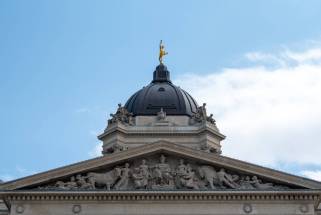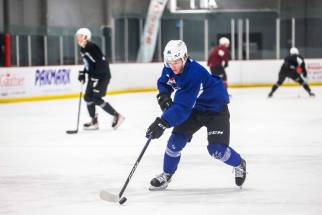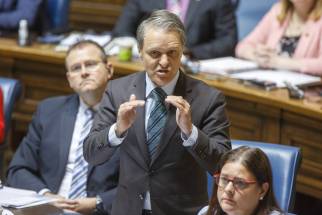Gillingham’s gambit poses real threat to Murray
Read this article for free:
or
Already have an account? Log in here »
To continue reading, please subscribe:
Monthly Digital Subscription
$0 for the first 4 weeks*
- Enjoy unlimited reading on winnipegfreepress.com
- Read the E-Edition, our digital replica newspaper
- Access News Break, our award-winning app
- Play interactive puzzles
*No charge for 4 weeks then price increases to the regular rate of $19.00 plus GST every four weeks. Offer available to new and qualified returning subscribers only. Cancel any time.
Monthly Digital Subscription
$4.75/week*
- Enjoy unlimited reading on winnipegfreepress.com
- Read the E-Edition, our digital replica newspaper
- Access News Break, our award-winning app
- Play interactive puzzles
*Billed as $19 plus GST every four weeks. Cancel any time.
To continue reading, please subscribe:
Add Free Press access to your Brandon Sun subscription for only an additional
$1 for the first 4 weeks*
*Your next subscription payment will increase by $1.00 and you will be charged $16.99 plus GST for four weeks. After four weeks, your payment will increase to $23.99 plus GST every four weeks.
Read unlimited articles for free today:
or
Already have an account? Log in here »
Hey there, time traveller!
This article was published 05/10/2022 (1158 days ago), so information in it may no longer be current.
You can bet that every single mayoral candidate has thought about it. But to date, only Scott Gillingham has put those thoughts into action.
“It” is a strategy to backfill some of the provincial government’s controversial cut to education property taxes with increased civic property taxes.
The city budget has, for some years now, included an automatic 2.3 per cent property tax hike to pay for infrastructure. Gillingham is promising an additional 1.2 per cent, resulting in a total property tax hike of 3.5 per cent each year until 2026.
The Gillingham campaign estimated the total increase to the average property tax bill would be around $65; $43 coming from the pre-existing 2.3 per cent hike, and an additional $22 from the new increase.
On top of that, Gillingham has proposed a one-time increase in frontage levies to pay for big infrastructure projects. That would add $75 to anyone who owns a standard 50-foot lot.
Together, Gillingham’s proposal would generate an additional $280 million over a four-year period — money that could go a long way to shoring up threadbare civic services.
MIKE DEAL / WINNIPEG FREE PRESS The Gillingham campaign estimated the total increase to the average property tax bill would be around $65; $43 coming from the pre-existing 2.3 per cent hike, and an additional $22 from the new increase.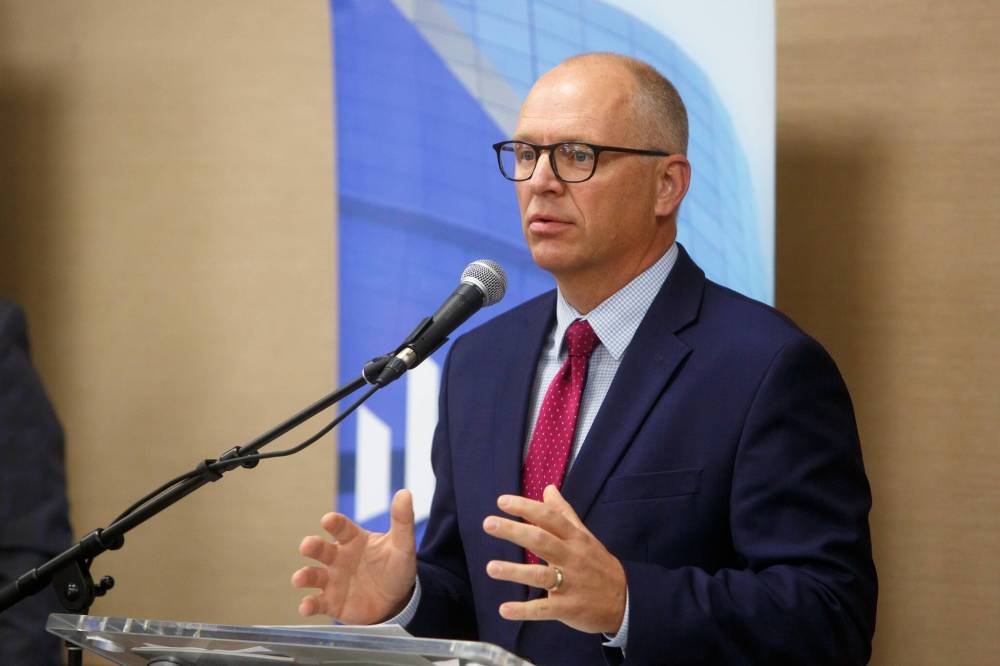
The beauty of this proposal is that it acknowledges something many voters already know: the city’s budget is running on fumes. The province has frozen operating grants and support for programs like Winnipeg Transit and ambulance services. Along with unfunded expenses from the pandemic and record-setting snowfall last winter, the civic fiscal picture is grim.
Gillingham’s solution is to take advantage of room created by the provincial government’s drastic cuts to the education levy, which accounts for roughly half of municipal tax bills.
The Progressive Conservative government rebated 25 per cent of the education levy to property owners in 2021, and an additional 12.5 per cent this year. Together, the rebates cost the provincial treasury just under $400 million.
Although the rebates put more money in people’s pockets, the Tories have reaped no political benefit as they continue to languish well behind the NDP in opinion polls. The message is pretty clear: Manitobans would prefer to see more support for health care and education than tax cuts.
While the rebates are liabilities on the provincial stage, for municipalities they represent an opportunity.
Gillingham can raise taxes and levies for a set period of time, and people will still pay less than they were two years ago. Given the fiscal challenges facing the city, his proposal is mathematically and fiscally sound.
But is it politically viable?
Gillingham’s solution is to take advantage of room created by the provincial government’s drastic cuts to the education levy, which accounts for roughly half of municipal tax bills.
In general, politicians try to avoid pledging to raise taxes during an election campaign, even when it’s the fiscally sound thing to do. It’s so much easier to float a bunch of costly ideas and then promise to cover the costs through “efficiencies.” Inside information from a veteran political observer: the term “efficiencies” is code for “we have no bloody idea how to pay for these things.”
There are exceptions to that caveat. In 2014, Mayor Brian Bowman promised to limit future property tax increases to the rate of inflation, which turned out to be just over two per cent. In 2018, he doubled down on that strategy, pledging to hold tax increases to 2.3 per cent for four years, with all of the money going into road rehabilitation. He won both elections.
Thanks to Bowman’s strategy, Gillingham can be fairly certain many voters understand that certainty around future tax hikes is preferable to uncertainty. And that property tax freezes are foolish.
If there is any peril in Gillingham’s proposal, it is that his strategy exceeds the levels set by Bowman. Now, Gillingham is about to find out if there is some sort of hidden threshold beyond which mayoral candidates should not promise to raise taxes.
Either way, Gillingham’s tax plan has the potential to alter the dynamics of the mayoral campaign.
MIKE DEAL / WINNIPEG FREE PRESS FILES Mayoral candidate Scott Gillingham can raise taxes and levies for a set period of time, and people will still pay less than they were two years ago.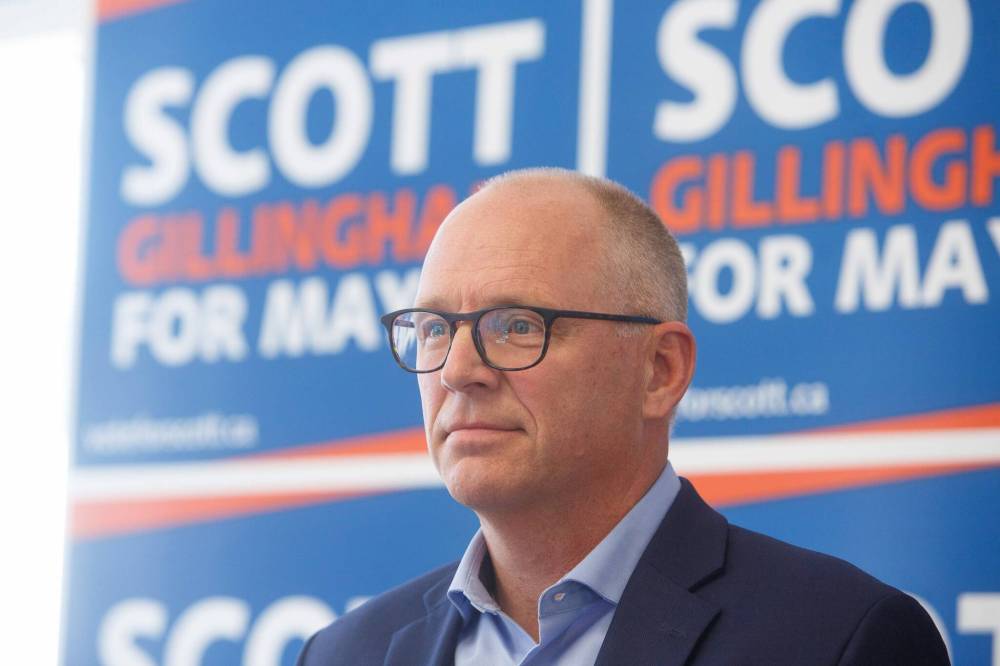
Before he floated this idea, we had Glen Murray (the front-runner according to recent polls) and candidates like Shaun Loney on the progressive left of the civic political spectrum. Candidates Rick Shone, Robert-Falcon Ouellette and Kevin Klein were holding down the fuzzy middle. And then you have Jenny Motkaluk.
The 2018 runner-up started her campaign solidly as a fiscal conservative but recently veered abruptly right toward the land of libertarian conspiracy theories. It’s an odd strategy that seems to be less about winning city hall than going out in a blaze of populist glory, and possibly positioning herself as a candidate for some other level of politics.
Gillingham’s proposal throws a wrench into all that typecasting.
Progressives will certainly have to give Gillingham another look given he’s clearly not prepared to gut recreation and other soft services to pay for police and pothole repairs.
In the most recent poll data, Gillingham was running well behind Murray. But the mercurial former mayor, who is back for a second act, is limping towards the finish line after facing allegations of harassment from his past.
Maybe the tax-hike proposal has come too late in the campaign. Maybe it will alienate as many middle-right voters as it will attract progressives.
But all in all, it’s the right thing to do. And maybe, just maybe, voters are prepared to get behind that.
dan.lett@winnipegfreepress.com

Born and raised in and around Toronto, Dan Lett came to Winnipeg in 1986, less than a year out of journalism school with a lifelong dream to be a newspaper reporter.
Our newsroom depends on a growing audience of readers to power our journalism. If you are not a paid reader, please consider becoming a subscriber.
Our newsroom depends on its audience of readers to power our journalism. Thank you for your support.
History
Updated on Thursday, October 6, 2022 8:15 AM CDT: The government rebated 12.5 per cent of the education levy to property owners this year.




